2006 年北京高考英语真题及答案
本试卷分第Ⅰ卷(选择题)和第Ⅱ卷(非选择题)两部分,第Ⅰ卷 1 至 16 页。第Ⅱ卷
17 至 18 页。共 150 分。考试时间 120 分钟。考试结束后,将本试卷和答题卡一并交回。
注意事项:
1.答题前考生务必分别将答题卡Ⅰ和答题卡Ⅱ上的姓名、准考证号用黑色字迹的签字笔填
写,用 2B 铅笔将准考证号对应的信息点涂黑。
2.答试卷第Ⅰ卷时,每小题选出答案后,用 2B 铅笔把答题卡Ⅰ上对应题目的答案选中涂满
涂黑,黑度以盖住框内字母为准。如需改动,用橡皮擦除干净后再选涂其它答案项。在
试卷上答题无效。
3.答试卷第Ⅱ卷时,必须用黑色字迹的签字笔按题号顺序答在答题卡Ⅱ的红色框答题区域
相应位置内,未在对应的答题区域做答或超出答题区域做答均不得分。在试卷上答题无
效。
第Ⅰ卷(选择题 共 115 分)
第一部分 听力(共两节,满分 30 分)
第一节 (共 5 小题;每小题 1.5 分,满分 7.5 分)
听下面 5 段对话。每段对话后有一道小题,从每题所给的 A、B、C 三个选项中选出最
佳选项。听完每段对话后,你将有 10 秒钟的时间来回答有关小题和阅读下一小题。每段对
话你将听一遍。
例:What is the man going to read?
A.A newspaper.
B.A magazine.
C.A book.
答案是 A。
1.What size does the woman want?
A.Size 8.
B.Size 10.
C.Size 12.
2.Where does the conversation take place?
A.In a post office.
B.In a hotel.
C.In a bank.
3.Why is the man going to New York?
A.To live there.
B.To visit a friend.
C.To have a vacation.
�
4.What are they going to do?
A.Play tennis.
B.Go swimming.
C.Do some cleaning.
5.What is the man doing?
A.Making an announcement.
B.Making an appointment.
C.Making an invitation.
第二节(共 15 小题;每小题 1.5 分,共 22.5 分)
听下面 6 段对话或独白。每段对话或独白后有几道小题,从每题所给的 A、B、C 三个
选项中选出最佳选项。听每段对话或独白前,你将有 5 秒钟的时间阅读每小题。听完后,每
小题将给出 5 秒钟的做答时间。每段对话或独白你将听两遍。
听第 6 段材料,回答第 6 至 7 题。
6.Who is this announcement for?
A.People on a train.
B.People on a plane.
C.People in a restaurant.
7.What time of the day is it?
A.Morning.
B.Noon.
C.Evening.
听第 7 段材料,回答第 8 至 9 题。
8.Where are the speakers?
A.At a Lost and Found.
B.At a bus stop.
C.In a shop.
9.Which of the following is the woman’s coat?
听第 8 段材料,回答第 10 至 11 题。
10.What are the speakers doing?
A.Watching a movie.
�
B.Having dinner.
C.Making soup.
11.What makes the man unhappy?
A.The woman doesn’t cook very well.
B.The woman seldom talks to him at dinner.
C.The woman watches too many commercials.
听第 9 段材料,回答第 12 至 14 题。
12.What does the man dislike about his job?
A.Working in a hotel.
B.Working in summer.
C.Traveling all the time.
13.Why doesn’t he want to take the new job?
A.He doesn’t get a good pay.
B.He dislikes working in a seaside town.
C.He hates playing the same piece again and again.
14.What does the woman think of the job the man was offered?
A.Boring.
B.Well-paid.
C.Tough.
听第 10 段材料,回答第 15 至 17 题。
15.What are they discussing?
A.What to have for lunch.
B.Where to go for lunch.
C.When to have lunch.
16.What can we learn about the man?
A.He usually doesn’t eat fast food.
B.He often eats in a restaurant near his home.
C.He can’t afford an expensive lunch that day.
17.Where are they probably going right after this conversation?
A.A supermarket.
B.A fast-food place.
C.A French restaurant.
听第 11 段材料,回答第 18 至 20 题。
18.Why didn’t the woman go to the man’s birthday party?
A.She forgot all about it.
B.She didn’t like the man.
C.She didn’t know about it.
19.Who is the woman?
A.The man’s friend.
�
B.The man’s mother.
C.The man’s secretary.
20.What does the woman want to do for the man’s birthday?
A.Buy him a nice present.
B.Have lunch with him.
C.Send him an email.
第二部分:知识运用(共两节,45 分)
第一节 单项填空(共 15 小题;每小题 1 分,共 15 分)
从每题所给的 A、B、C、D 四个选项中,选出可以填入空白处的最佳选项,并在答题卡
上将该项涂黑。
例:It’s so nice to hear from her again _____, we last met more than thirty years
ago.
A.What’s more
C.In other words
答案是 D
B.That’s to say
D.Believe it or not
21.This washing machine is environmentally friendly because it uses _____ water
and electricity than _________ models.
A.less; older
C.fewer, older
B.less; elder
D.fewer; elder
22.-When do we need to pay the balance?
-__________ September 30.
A.In
C.During
B.By
D.Within
23.She went to the bookstore and bought _________.
A.dozen books
C.dozen of books
B.dozens books
D.dozens of books
24.-Which driver was to blame?
-Why, ________! It was the child’s fault, clear and simple. He suddenly came
out between two parked cars.
A.both
C.either
25.-What’s the name?
B.each
D.neither
-Khulaifi. ________ I spell that for you?
A.Shall
B.Would
C.Can
D.Might
26.-I knocked over my coffee cup. It went right over __________ keyboard.
-You shouldn’t put drinks near _________ computer.
A.the; 不填
B.the; a
C.a; 不填
D.a; a
27.-_______ leave at the end of this month.
-I don’t think you should do that until _________ another job.
A.I’m going to; you’d found
B.I’m going to; you’ve found
�
C.I’ll; you’ll find
D.I’ll; you’d find
28.There have been several new events _______ to the program for the 2008 Beijing
Olympic Games.
A.add
C.adding
B.to add
D.added
29.-Could you do me a favor?
-It depends on ______ it is.
A.which
B.whichever
C.what
D.whatever
30.-Your job _______ open for your return.
-Thanks.
A.will be kept B.will keep
C.had kept
D.had been kept
31.Women _______ drink more than two cups of coffee a day have a greater chance
of having heart disease than those ________ don’t.
A.who; 不填
C.who; who
B.不填; who
D.不填; 不填
32.-Where did you put the car keys?
-Oh, I ______ I put them on the chair because the phone rang as I _______ in.
A.remembered; come
B.remembered; was coming
C.remember; come
D.remember; was coming
33._______ you’ve tried it, you can’t imagine how pleasant it is.
A.unless
B.Because
C.Although
D.When
34.He found it increasingly difficult to read, ______ his eyesight was beginning
to fail.
A.and
B.for
C.but
D.or
35.I can’t stand _______ with Jane in the same office. She just refuses ______
talking while she works.
A.working; stopping
B.to work; stopping
C.working; to stop
D.to work; to stop
第二节 完形填空(共 20 小题;每小题 1.5 分,共 30 分)
阅读下面短文,掌握其大意,从每题所给的 A、B、C、D 四个选项中,选出最佳选项,
并在答题卡上将该项涂黑。
Learning to Accept
I learned how to accept life as it is from my father.
36
, he did not teach
me acceptance when he was strong and healthy, but rather when he was
37
and ill.
My father was
38
a strong man who loved being active, but a terrible illness
39
all that away. Now he can no longer walk, and he must sit quietly in a chair
all day. Even talking is
40
. One night. I went to visit him with my sisters.
We started
41
about life, and I told them about one of my
42
. I said that we must very
often give things up
43
, we grow-our youth, our beauty, our friends-but it
�
always
44
that after we give something up, we gain something new in its place.
Then suddenly my father
45
up. He said, “But, Peter, I gave up
46
! What
did I gain?” I thought and thought, but I could not think of anything to say,
47
,
he answered his own question: “I
48
the love of my family.” I looked at my
sisters and saw tears in their eyes, along with hope and thankfulness.
I was also
49
by his words. After that, when I began to feel irritated(恼
怒的) at someone, I
50
remember his words and become
51
. If he could replace
his great pain with a feeling of love for others, then I should be
52
to give
up my small irritations. In this
53
. I learned the power of acceptance from my
father.
Sometimes I
54
what other things I could have learned from him if I had
listened more carefully when I was a boy. For now, though, I am grateful for this
one
55
.
36.A.Afterwards
B.Therefore
C.However
D.Meanwhile
37.A.tired
38.A.already
39.A.took
B.weak
B.still
B.threw
C.poor
C.only
C.sent
D.slow
D.once
D.put
40.A.impossible
B.difficult
C.stressful
D.hopeless
41.A.worrying
B.caring
C.talking
D.asking
42.A.decisions
B.experiences
C.ambitions
D.beliefs
43.A.as
B.since
C.before
D.till
44.A.suggests
B.promises
C.seems
D.requires
45.A.spoke
B.turned
C.summed
D.opened
46.A.something
B.anything
C.nothing
D.everything
47.A.Surprisingly B.Immediately
C.Naturally
D.Certainly
48.A.had
B.accepted
C.gained
D.enjoyed
49.A.touched
B.astonished
C.attracted
D.warned
50.A.should
51.A.quiet
52.A.ready
53.A.case
54.A.doubt
55.A.award
B.could
B.calm
C.would
C.relaxed
B.likely
C.free
B.form
C.method
B.wonder
C.know
B.gift
C.lesson
D.might
D.happy
D.able
D.way
D.guess
D.word
第三部分:阅读理解(共 20 小题;每小题 2 分,共 40 分)
阅读下列短文,从每题所给的 A、B、C、D 四个选项中,选出最佳选项,并在答题卡上
将该项涂黑。
A
How to Make a Budget(预算)
�
Most likely, you aren’t the family breadwinner. But doing a small job or getting
a weekly allowance( 零 花 钱 ) would put some money in your pocket. For kids and
grown-ups alike, money is easy to spend. If you aren’t careful, it can be gone in
no time.
Being responsible with your money is an important skill to learn-and the sooner
you start the better. Whether you are tracking your spending or saving for something
special, creating a budget can help you deal with your expenses and plan for the
future. All you need are paper and a pencil-and some self-control.
First, take a look at our sample monthly budget. Then, use a separate sheet
of paper to plan your own. In the first two columns(栏), list your sources(来源)
of income and how much you expect to earn form them. In the third and fourth columns,
list what you expect to spend your money on and the amount.
The
left-hand
total should be more
than or equal to the
right-hand total. If
it is, you have an
effective budget.
Budgets are not
complex,
but
sticking to them can
Sample Monthly Budget
Monthly Income
Allowance
Money earned
Selling drinks
Money earned
babysitting
Money earned
Amount Monthly Expenses Amount
$ 20.00 Snacks
$ 26.00
$ 12.00
$ 25.00 Music
downloads
$ 12.50 Movies
$ 18.00
$ 30.00 Video rentals
$ 10.00
be tough. When planning your budget, be realistic about your expenses. If you know
that you drop $ 18 at a movie, don’t write $ 12 in that space simply because you
wish you were spending less.
If you are eyeing a big purchase, such as a $ 150 skateboard, spend less and
save more until you have the total amount. No matter how attractive it may be, avoid
spending your savings. One day, you will thank yourself?
56.Who is the passage written for?
A.Children
C.Breadwinners.
B.Parents.
D.Bank managers.
57.The purpose of making a budget is to help people __________.
A.learn to be realistic
B.increase their savings
C.manage their money well
D.test their power of self-control
58.What should people do when planning a budget?
A.Fill in the expenses as they really are.
B.Avoid spending money on expensive things.
C.Set aside a fixed amount of money as savings.
�
D.List income and expenses on two pieces of paper.
59.Which of the following budgets is effective?
B
I was 9 years old when I found out my father was ill. It was 1944, but I can
remember my mother’s words as if it were yesterday: “ Kerrel, I don’t want you
to take food from your father, because he has AIDS. Be very careful when you are
around him.”
AIDS wasn’t something we talked about in my country when I was growing up.
�
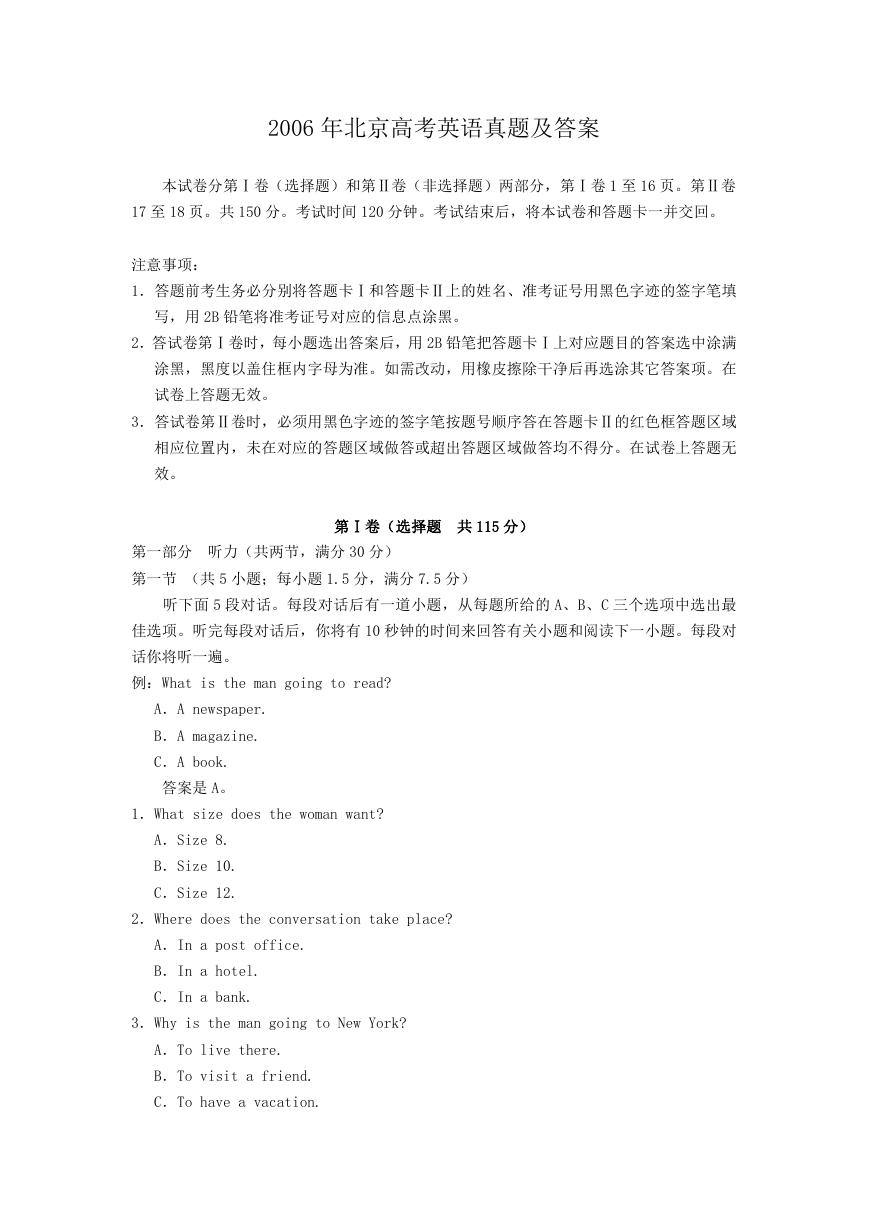
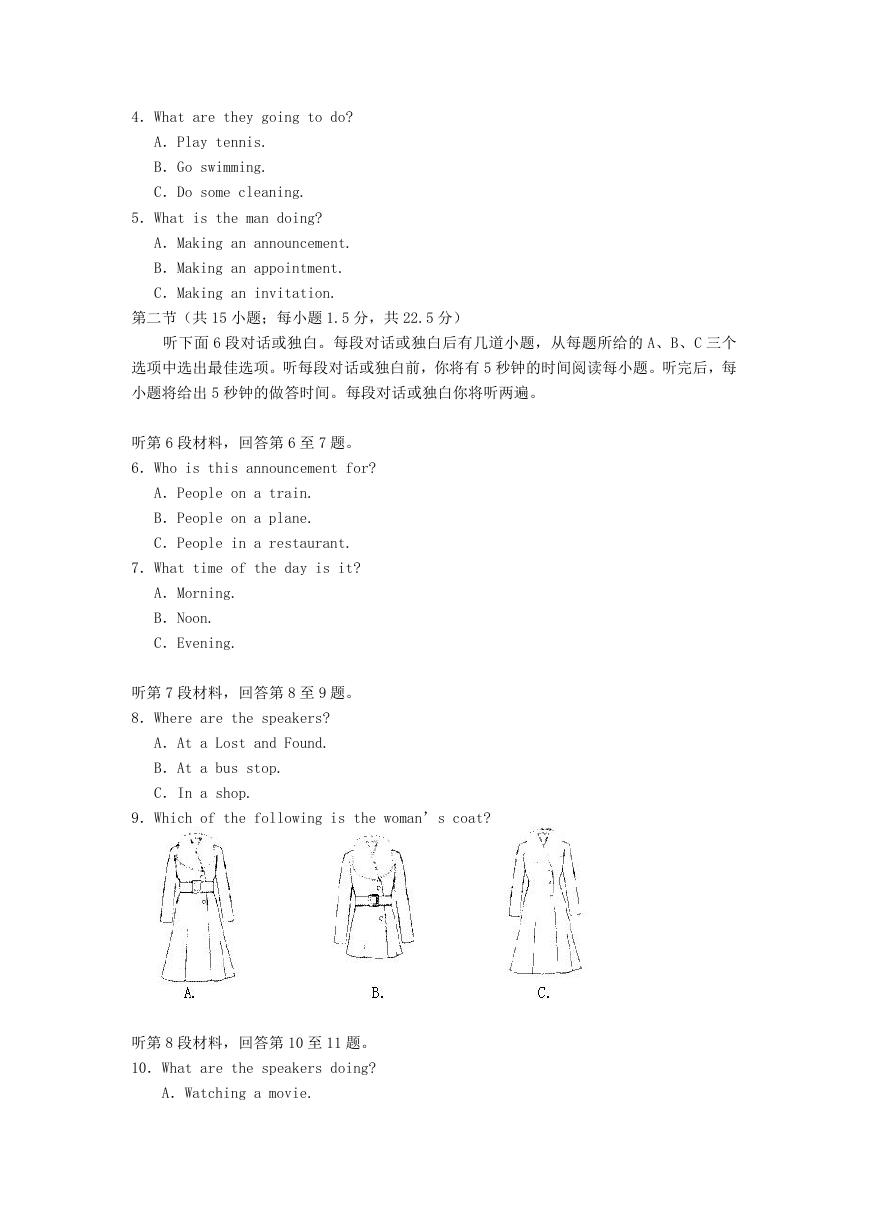
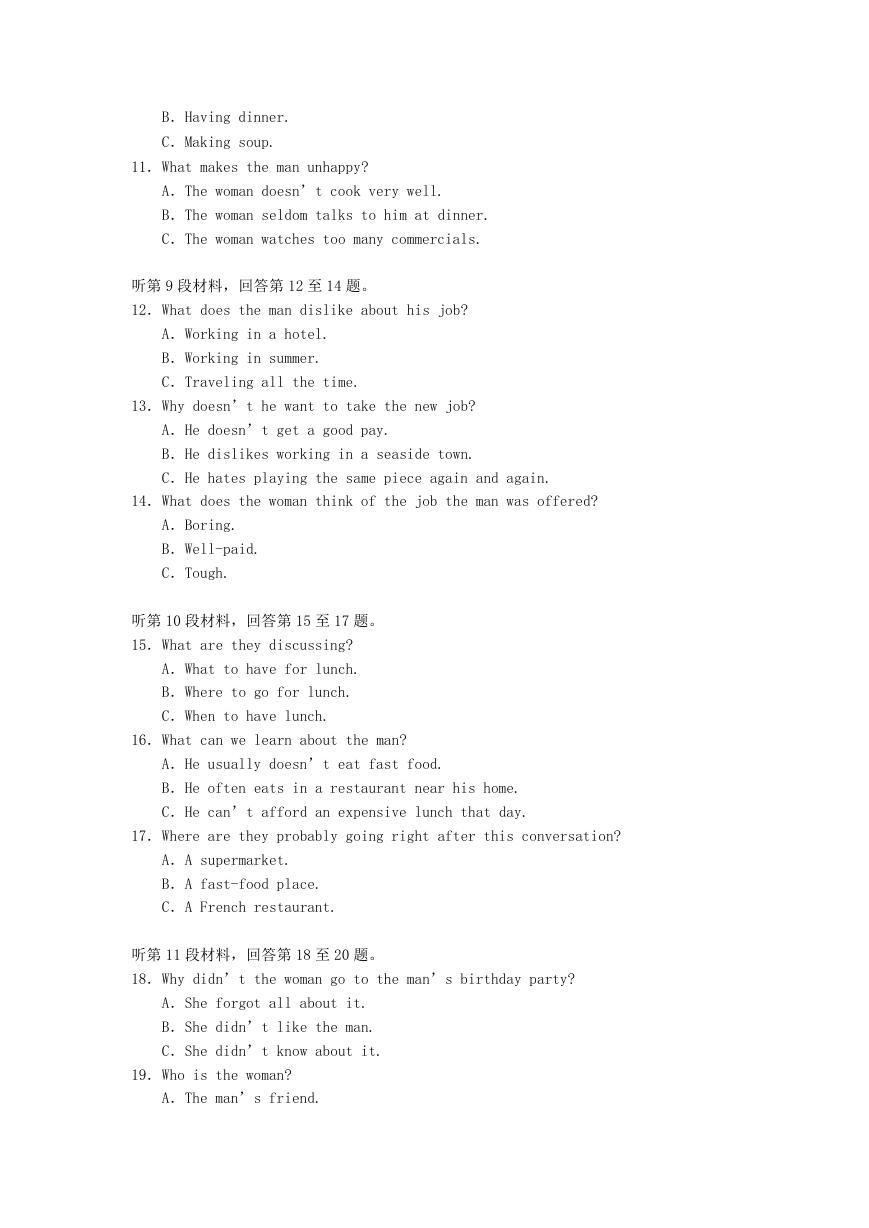

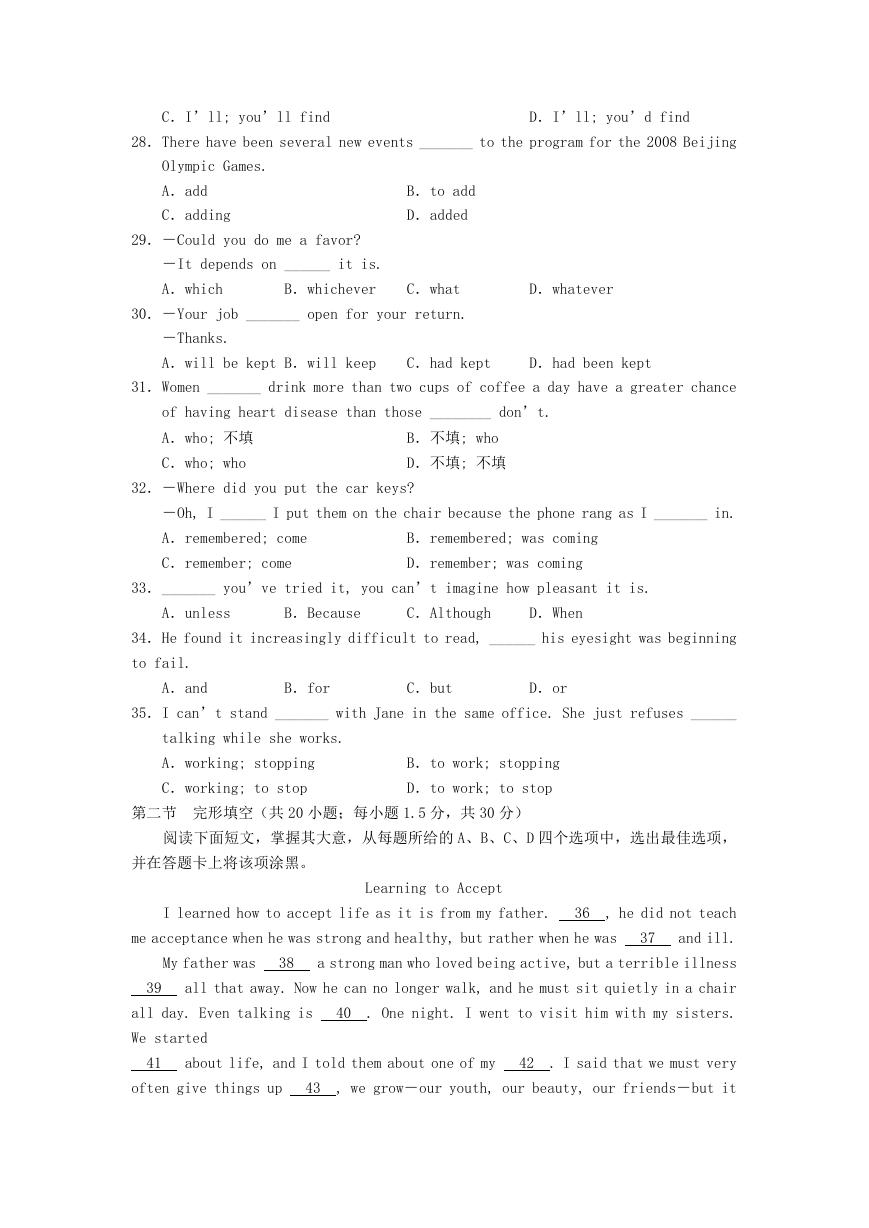
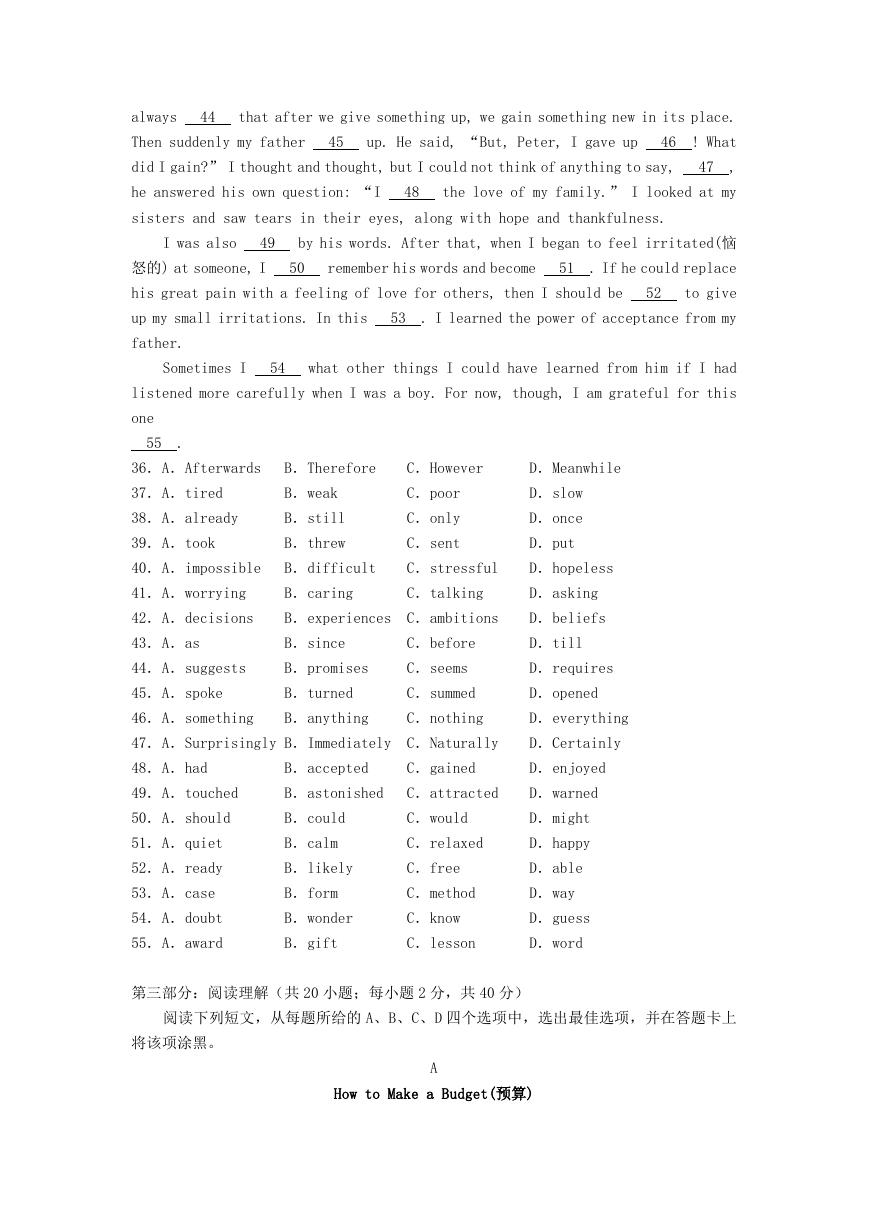
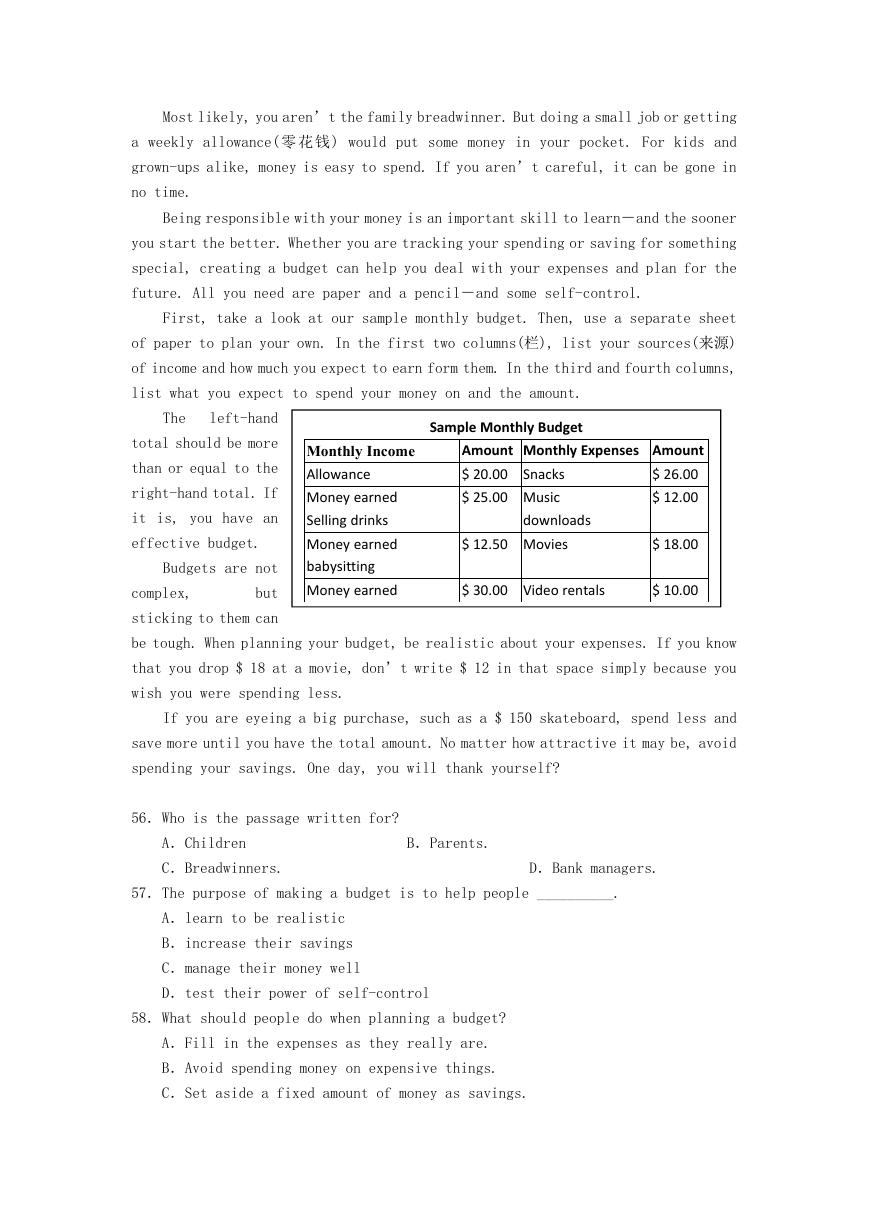









 2023年江西萍乡中考道德与法治真题及答案.doc
2023年江西萍乡中考道德与法治真题及答案.doc 2012年重庆南川中考生物真题及答案.doc
2012年重庆南川中考生物真题及答案.doc 2013年江西师范大学地理学综合及文艺理论基础考研真题.doc
2013年江西师范大学地理学综合及文艺理论基础考研真题.doc 2020年四川甘孜小升初语文真题及答案I卷.doc
2020年四川甘孜小升初语文真题及答案I卷.doc 2020年注册岩土工程师专业基础考试真题及答案.doc
2020年注册岩土工程师专业基础考试真题及答案.doc 2023-2024学年福建省厦门市九年级上学期数学月考试题及答案.doc
2023-2024学年福建省厦门市九年级上学期数学月考试题及答案.doc 2021-2022学年辽宁省沈阳市大东区九年级上学期语文期末试题及答案.doc
2021-2022学年辽宁省沈阳市大东区九年级上学期语文期末试题及答案.doc 2022-2023学年北京东城区初三第一学期物理期末试卷及答案.doc
2022-2023学年北京东城区初三第一学期物理期末试卷及答案.doc 2018上半年江西教师资格初中地理学科知识与教学能力真题及答案.doc
2018上半年江西教师资格初中地理学科知识与教学能力真题及答案.doc 2012年河北国家公务员申论考试真题及答案-省级.doc
2012年河北国家公务员申论考试真题及答案-省级.doc 2020-2021学年江苏省扬州市江都区邵樊片九年级上学期数学第一次质量检测试题及答案.doc
2020-2021学年江苏省扬州市江都区邵樊片九年级上学期数学第一次质量检测试题及答案.doc 2022下半年黑龙江教师资格证中学综合素质真题及答案.doc
2022下半年黑龙江教师资格证中学综合素质真题及答案.doc